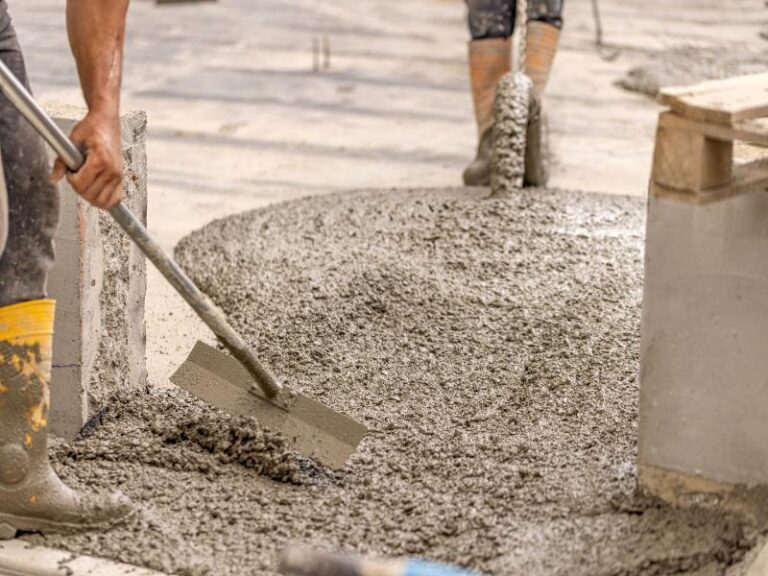Why is it important to use high-quality concrete slabs for garages? It’s important to work with an expert in concrete and cement when laying your garage floor. Otherwise, you could end up with cracks, settling, or crumbling.
A durable garage floor takes more than just pouring the concrete–it’s a complex system with multiple steps needed to create the end result.
At Rea and Son Cement Co., we have nearly 50 years of experience laying garages in Canton, MI, and the surrounding area. Based on our expertise, we’re one of the best choices to build your garage floor.
How Are Garages Made? – Why Quality Matters From the Start
Subgrade
Quality concrete garages start at the subgrade level. Subgrade is the soil or ground beneath the garage.
Before garages are poured, it’s essential to prepare this level by removing topsoil and organic material, leveling the area to make it even, and compacting the ground. This ensures the concrete slab has a stable, uniform foundation.
Sub-Base
After the subgrade is ready, the professional concrete company will add a base layer on top of it. This sub-base layer consists of crushed stone, gravel, or recycled concrete.
The sub-base is important for evenly distributing the weight of the concrete slab, as well as any vehicles parked on it. It also acts as a form of drainage that prevents water damage from occurring under the slab.
Vapor Barrier
A vapor barrier is commonly placed under garages to prevent moisture vapors from affecting the concrete slab. Barriers are usually a high-quality plastic sheet, and they protect the concrete from mold and mildew, freeze-thaw damage, and damage to the floor’s coating and sealant.
Working with a professional contractor experienced in garages is essential to make sure the right material and quality is used for the vapor barrier.
Concrete Slab
When these steps are completed, it’s time to start pouring the concrete. High-quality garages start with the right concrete mixture. There should be a balance between the cement, aggregates like sand and gravel, and water.
Reinforcement also needs to be added to support the concrete slab. This typically includes a combination of steel rebar and wire mesh. The rebar adds strength to the slab and holds it together, while the mesh prevents surface cracks.
The thickness of the slab is another consideration. Most concrete garages are 4 to 6 inches thick, but the slab can be made thicker depending on the amount of weight it will hold.
Finishing & Curing
The last part of setting up concrete garages is the curing process. Doing this step correctly is important to make sure the slab is set up and ready to handle weight. Professional concrete companies will smooth the service of the top layer to make it look nice.
Then, they’ll begin curing the slab, which is a chemical process that keeps the concrete layer moist for a period of weeks. This allows the slab to become strong and durable, and prevents cracking.
Need an Expert in Garages? Contact Rea & Son Cement Co. Today
All these steps are necessary for high-quality concrete garages. A garage is more than just the concrete slab–it’s the sum of each one of its parts.
When you’re hiring concrete contractors, look for a company that is experienced in the entire concrete process. At Rea & Son Cement Co., we have 49+ years of experience as Southeast Michigan’s top concrete contractor.
If you need concrete floors for your garages, our team delivers reliable work backed by our quality guarantee and warrantied craftsmanship.
Need an expert in garages in Canton, MI? Call (734) 425-7966 or contact us online to get started today.

